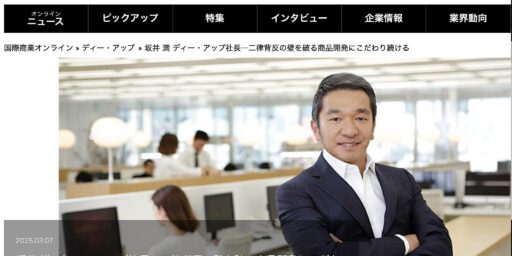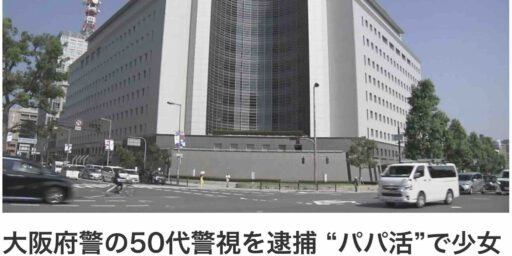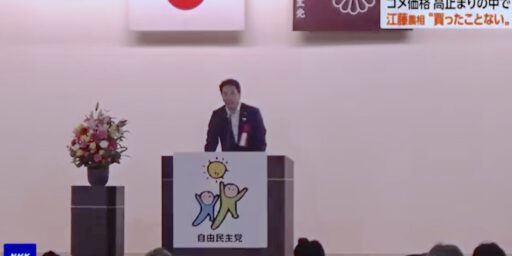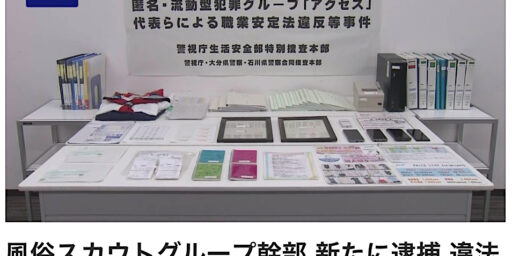ザ・外人問題、ウンコ外人、クソ外人、ヘンタイ外人、嫌い外人、怖い外人、汚い外人、臭い外人、野蛮外人 外人出ていけ!にっぽん第一!

それについて何を書けばいいの?🤣








Sie gehören alle in den After ge*ickt、x6、だよね。🤣

令和7年7月22日
ザ・外人 亜

令和7年7月29日アップデート:
「AV女優が使ったドレスは着たくない」は「黒人の泳いだプールには入りたくない」と同じだよ。まともな人間なら口にはしない。
https://x.com/BugsGroove/status/1949637843426718063
ゥチ 黒人っていうか南米とハーフなんだけど、これに5万いいねついてて絶望
これも差別って言われたらそれまでだけど、なんで生まれ持った人種とAV女優っていう仕事を同列にして語るわけ⁉️😭😭 普段どうせ人種差別に興味無いだろうからこういうばっかり黒人のこと引き合いに出すのマジでやめてね
https://x.com/Y4V7c/status/1949820615927455878
穢多非人などの血族差別が皮革加工業など特定の職業差別に端を発してることを知ってればこんなこと口が裂けても言えないはずなんですけどね。そもそも職業は自由選択できるという前提からしてだいぶ疑わしいわけで。19世紀レベルの差別意識を令和に持ち込まないでほしい。
https://x.com/Segah02457547/status/1950107762731422064

令和7年8月28日アップデート:
光源氏🇯🇵
@hikaruganji
もう正直に言います。日本人は外国人にうんざりしています。母国に帰って下さい。
日本人1億人以上の民意です。
I’ll be honest. Japanese people are fed up with foreigners. Please go back to your home country.
This is the will of the Japanese people, over 100 million strong.
〜〜
トシ🇯🇵
@WpYRnmCg9A83851
中国人
朝鮮人
クルド人
ベトナム人
その他外国人が増え過ぎてウンザリしている💢
もう
外国人は嫌いだ💢
鎖国したい!
Chinese people
Korean people
Kurdish people
Vietnamese people
I’m sick and tired of there being too many other foreigners 💢
I’m done
I hate foreigners 💢
I want to close the country off!
https://x.com/WpYRnmCg9A83851/status/1960583989720441228
Link_https://x.com/WpYRnmCg9A83851/status/1960583989720441228
https://x.com/hikaruganji/status/1960567839196373218
Link_https://x.com/hikaruganji/status/1960567839196373218
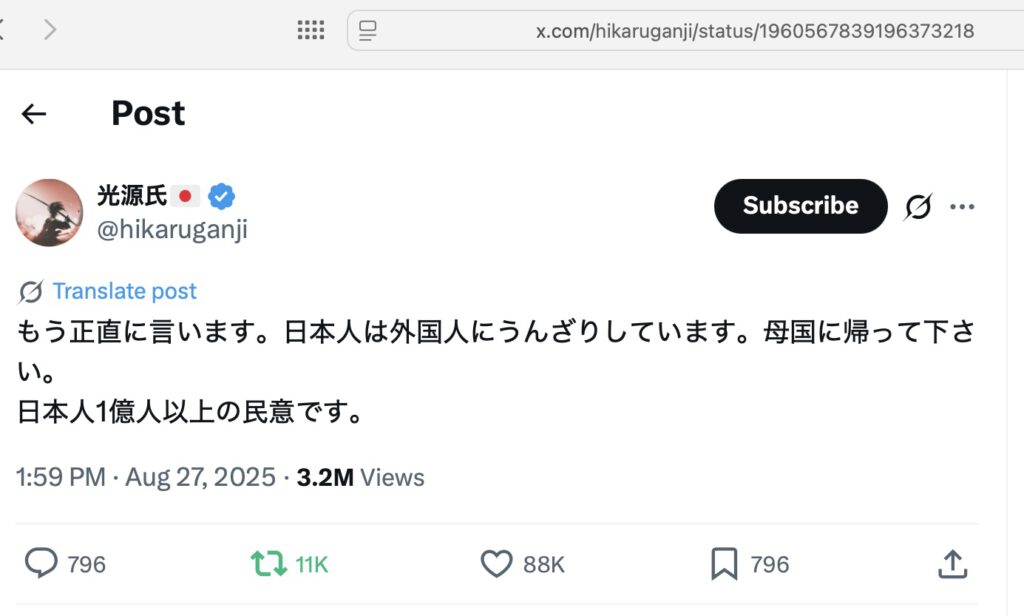
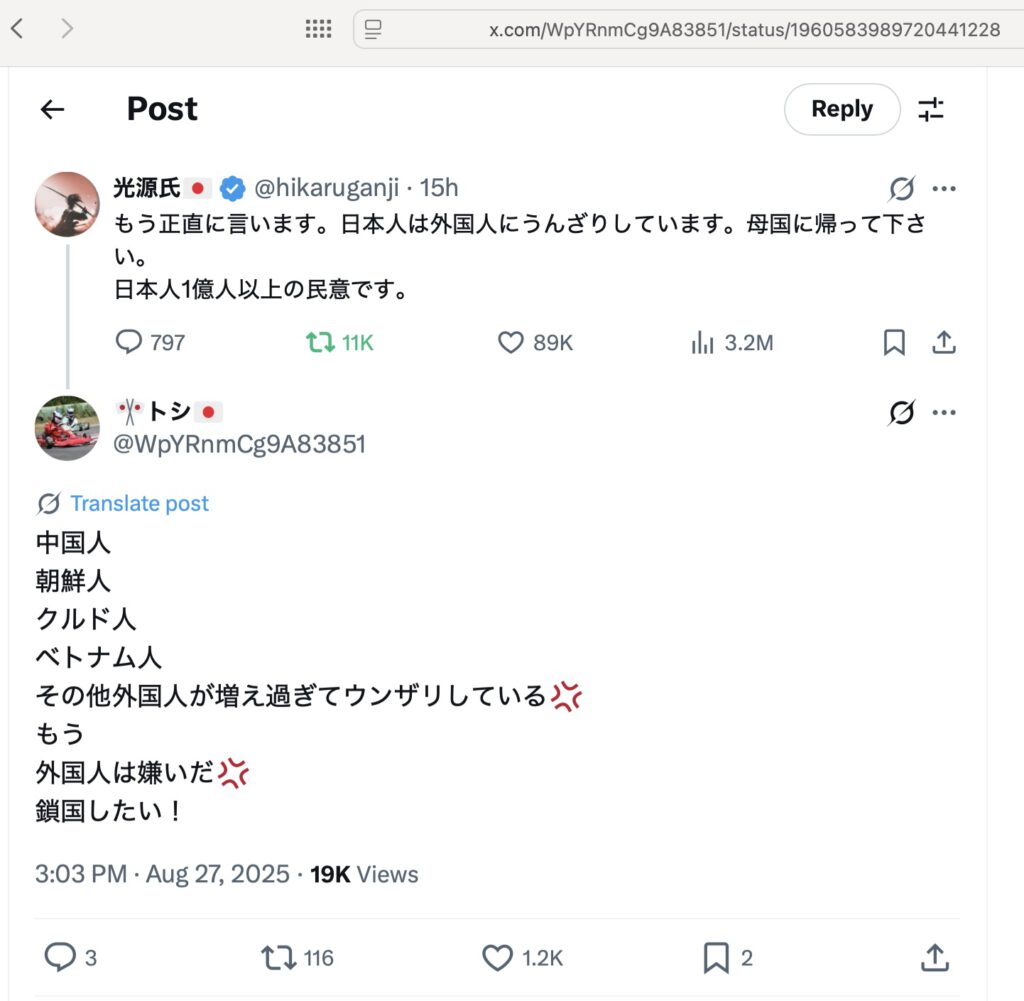
(end of up-date)

アップデート:
日本の総人口約1億2433万人 55万人減少【都道府県別データも】
2025年8月6日 18時05分
日本人の人口 減少数・減少率ともに最大
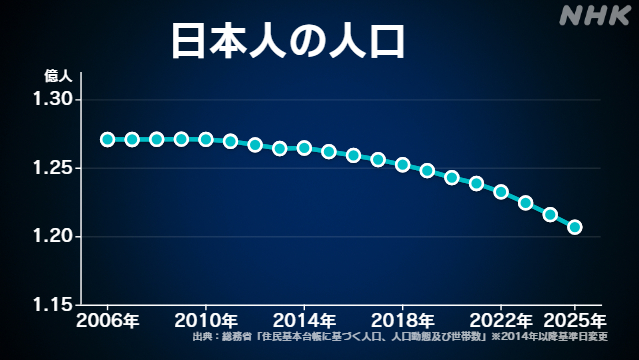
国内に住む外国人の人口 調査開始以降最多 増加数も最大
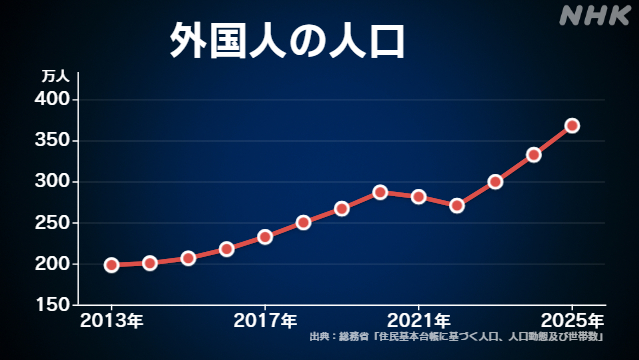
【都道府県別 外国人人口】
外国人の人口は
▽東京都が最も多く72万1223人
▽大阪府 32万8128人
▽愛知県 32万1905人
▽神奈川県 28万4889人
▽埼玉県 25万7656人となっていて、
上位5つの都府県で全体の半数以上を占めています。
一方、最も少ないのは
▽秋田県 5753人
▽鳥取県 6005人
▽高知県 6661人
▽青森県 8415人
▽徳島県 8769人などとなっています。
外国人の人口は、47都道府県すべてで増加しました。
人口増加数が最も多いのは
▽東京都で7万3807人、次いで▽大阪府 3万1549人、▽埼玉県 2万7422人などとなっています。
一方、増加数が最も少ないのは
▽鳥取県 496人、次いで▽秋田県 531人、▽高知県695人などとなっています。
https://www3.nhk.or.jp/news/html/20250806/k10014886001000.html

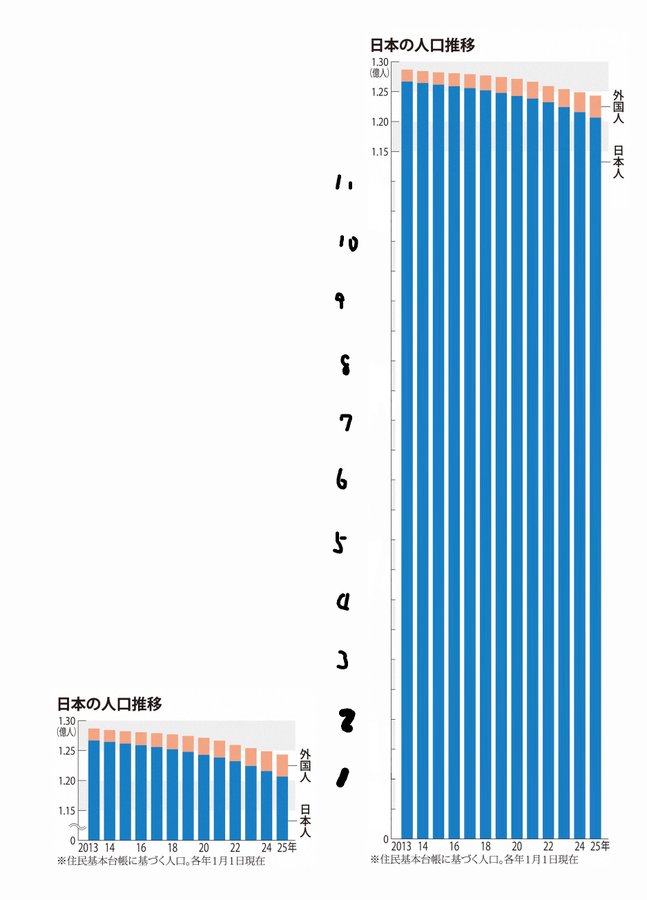
日本人、減少数・率が過去最大 外国人367万人 人口動態調査
毎日新聞、2025/8/6
総務省は6日、住民基本台帳に基づく2025年1月1日現在の人口動態調査を発表した。国内の日本人の人口は1億2065万3227人で、前年に比べ90万8574人(0・75%)減った。減少は16年連続で、減少数、減少率ともに1968年の調査開始以降で最大だった。一方、外国人の人口は過去最多の367万7463人で、前年比35万4089人(10・65%)増。増加数は13年の調査開始以降で最大だった。
日本人人口のうち死亡者数から出生者数を差し引いた「自然減」は人口減少の主な要因とされており、過去最大の91万2161人減となった。24年1年間の死亡者数は159万9850人と過去最多。出生者数は68万7689人で最も少なく、初めて70万人を割った。海外からの転入者と転出者の差などを示す「社会増減」は3587人増だった。
日本人と外国人を合わせた総人口は、前年比55万4485人(0・44%)減の1億2433万690人だった。
東京、名古屋、関西の3大都市圏の人口が全体に占める割合は53・09%で、前年より0・21ポイント増え、13年連続で増加し、過去最高を更新した。
都道府県別では、東京都が9万632人(0・65%)増、千葉県が1421人(0・02%)増で、総人口が減少傾向にある中、首都圏への一極集中が改めて浮き彫りとなった。他の道府県は減少し、最も減少率が大きかったのは秋田県の1・84%減だった。減少率2位は青森県の1・64%減、3位は高知県の1・59%減だった。
全国の世帯数は6128万7994世帯で前年比50万8853世帯(0・84%)増。1世帯の平均人数は2・03人で0・02人減った。
日本人のうち65歳以上の高齢者は3569万2697人で、前年から減少に転じた。「生産年齢人口」に当たる15~64歳は7123万5169人。14歳以下は1372万5356人で、調査開始以降、31年連続で減少した。人口構成は65歳以上が29・58%、15~64歳が59・04%、14歳以下が11・38%だった。
外国人は新型コロナウイルスの感染拡大が落ち着いてきたことを背景に3年連続で増え、全都道府県で増加した。最も増えたのは東京都の7万3807人。増加率では北海道の19・57%増が最も大きく、宮崎県(18・28%増)、佐賀県(16・39%増)と続いた。
https://mainichi.jp/articles/20250806/k00/00m/010/281000c
Up-date 2025/9/1
Japan to launch broad review of immigration policies amid rise in foreign nationals
Aug 29, 2025
The government is set to begin a fundamental review of its immigration policy, including whether to impose caps, as Japan sees the number of foreign nationals increase rapidly, according to a report released Friday by Justice Minister Keisuke Suzuki.
A new task force is expected to be established soon in order to conduct surveys on the impacts of rising foreign resident numbers, with the findings to be used in shaping future immigration policies.
The main concern, according to the report, is to prevent social division between foreign nationals and citizens, as seen in other Group of Seven developed nations. Caps on foreign nationals coming into the country may be considered “if signs emerge that friction has exceeded tolerable levels,” the report says.
“Other countries have struggled with integration, leading in many cases to social division or political turmoil. Japan, too, must prepare early,” Suzuki said during a news conference Friday.
Since February, the minister has held a series of private meetings with academics familiar with immigration policies to identify key issues regarding the acceptance of foreign nationals. The interim report, completed after six months of debate, points out that “as the proportion of foreign nationals rises, the impact on Japanese society will grow, and various complex challenges may arise.”
“We are currently facing population decline, and at the same time, foreign resident numbers are increasing at an accelerating pace,” he added. “With the foreign resident percentage projected to reach 10%, it is essential to forecast and analyze what kind of society and economy Japan will become, and to examine our fundamental approach to foreign resident policy.”
Foreign residents currently make up just 2.82% of Japan’s population, but the figure is projected to reach 10.8% by 2070. However, declining birthrates and the rising number of foreign residents could accelerate that timeline. The number of births in Japan in 2024 fell below 690,000, a level that had not been expected until 2039, according to the report.
Meanwhile, the number of foreign residents has surged in recent years, increasing 300,000 annually since the end of the pandemic, and topping 350,000 in 2024.
“Until now, there has been little strategic debate on the necessity or limits of accepting foreign residents, or on frameworks for quantitative management and system adjustments,” Suzuki added. “That is our key concern.”
The report released Friday stresses that Japan is at a turning point and that current ad-hoc measures on immigration are no longer sufficient.
The report identifies seven categories that need to be discussed in regards to foreign immigration: economic growth, industrial policy, labor policy, taxation and social security, community life, public safety and immigration control.
Without “unified long-term policy,” increases in foreign residents could significantly affect daily life in Japan, including wages, working conditions, social security systems and public safety, the report warns.
It recommends building multiple economic growth scenarios based on different scales of intake of foreign nationals, clarifying the roles of national and local governments and establishing programs to better integrate them into society to ease friction in communities with growing foreign populations.
The report also proposed strengthening immigration measures and oversight, introducing electronic travel authorization by 2028, reducing the average screening process for applicants seeking asylum to six months by 2030, expanding deportation capacity and tightening crackdowns on those working illegally.
With regards to business, student and professional visa categories, the report outlined reforms and urged closer coordination between the Immigration Services Agency and the Justice Ministry, which separately deal with approval of permanent residency and naturalization.
The report also called for the need to consider what would happen if Japan caps the number of specified skilled workers and less skilled workers aimed at becoming skilled workers under a new training program to be launched in fiscal 2027.
“Safeguarding the safety and security of Japanese citizens must remain the government’s top priority,” the report says. “Japan must work toward true coexistence with foreign nationals, while preparing for an era when foreign nationals comprise 10% of the population.”
https://www.japantimes.co.jp/news/2025/08/29/japan/society/immigration-policy-report/


up-date 2025/9/18
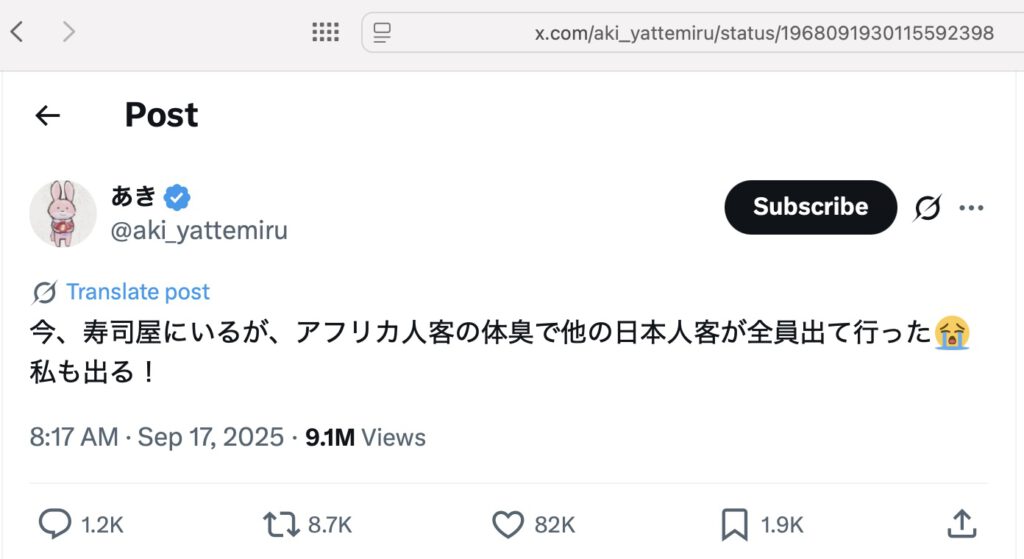
あき
@aki_yattemiru
今、寿司屋にいるが、アフリカ人客の体臭で他の日本人客が全員出て行った😭 私も出る!
8:17 AM · Sep 17, 2025 ·9.1M Views
I’m at a sushi restaurant right now, but the body odor of the African customer made all the other Japanese customers leave 😭 I’m leaving too!
https://x.com/aki_yattemiru/status/1968091930115592398
up-date 2025/10/13
DANNY JIN
@DANNYJIN
japanese × Palestinian 🇵🇸
Artist
mail me for booking or interview
取材やブッキングはメールまで
hojicha.crew@gmail.com
https://linktr.ee/dannyjinhojicha
各種ストリーミングサイト配信中
ArtistTokyo-to, JapanJoined July 2023
245 Following
4,295 Followers
https://x.com/DANNYJIN
Verse
最近外人ばかりって俺にいわれても
2005年生まれた時から俺はここにいる
子供の頃は外人なんてそう滅多にいなくて
常に目で指を指されているような気分
電車乗ったらジロジロ
すれ違う人に覗かれる顔
知らない人から挨拶はハロー
向けられた眼光
笑った顔で返した、
視線の理由がわかるまで
中指立てて返した、
受け入れて諦めるまで
今でも覚えてる子供のとき
だにーは日本人じゃない
悪気ない純粋な子供の言葉
が教えた
ハーフじゃないよ君はダブル
そんなんのは綺麗事ミラクル
俺達は常に狭間の中で生きてる
勘違いすんな
今に始まったんじゃねぇこれは
国籍に母親、育ちに生まれは
日本でも 違う顔
俺はあいつらが言い出す前から
自分に言い聞かしてた
こんなこと気にすんな同胞
Hook
君に言われなくてもわかるのさ
俺はずっとここじゃセカンドでさ
全てしって諦めついたから
笑顔で子供手を振るんだ
皆が言わなくてもわかるから
俺はずっとここじゃセカンドでさ
ビートの上では いつもなぜか
まだ 立てる指 一つだけさ
2nd verse
中坊の時から、うざかったこの国が
無能な民に政治家 さっさと出てやりたかった
けどラッパーになって
ツアーで色んなとこにいって、色んな人と色んな飯を食って色んな夜を過ごして
日本はこんなにもいいところがあるんだって
好きになってきたころ
思い出して我に返る
最近は人の目からヘイトを感じる
俺が大人になったのか、この国が幼稚になったのか
「調子乗るな外人」
「嫌なら国に帰れ」
仲間思い出ここにあっても
敵になる投票所
内にできた
痛い痛いを紙飛行機にし飛ばして
涙枯らす代わりに この気持ちを枯らした
すれ違う人に笑顔でハローって返せるようになった 子供の時みたいに
自分を日本人と呼ぶのは止めた
あなたはファースト
俺はセカンド
俺のホームはどこにあるの
Hook
2025年10月24日のアップデート
Multicultural inclusivity and regulation key to Japan’s foreigner policy: Gunma gov.
October 22, 2025 (Mainichi Japan)
Japan is facing major debate regarding policies related to foreigners, including foreign workers, refugees and inbound tourists. The House of Councillors election this past July saw the rise of the populist party Sanseito, which ran under a “Japanese First” slogan during the campaign, and candidates in the recent Liberal Democratic Party (LDP)’s leadership race all called for stricter policies on foreign nationals.
How should Japan approach its relationship with foreigners? How can a society based on coexistence be realized? The Mainichi Shimbun recently spoke with Gunma Gov. Ichita Yamamoto to discuss the prefecture’s efforts in balancing multicultural coexistence and regulation. Below are excerpts of Yamamoto’s comments:
—
Gunma Prefecture’s “basic plan for promoting multicultural coexistence and co-creation” centers on the vision of a “self-reliant and decentralized society” where all residents — regardless of age, gender, nationality or disability — can be happy. This vision has a clear direction toward building multicultural coexistence as a foundational element of society.
Over the past six years as governor, however, I have found how challenging this vision is to achieve. Already, the regional economy cannot go on without foreign residents, who support many sectors including construction, agriculture, caregiving and manufacturing. At the same time, there are persistent concerns among residents about illegal employment and public safety.
Foreigner policy and illegal work issues have become major topics in national politics, as seen in the LDP leadership election. Opinions advocating for regulation of foreigners and maintaining order are spreading even among moderate conservatives and are becoming a widespread sentiment in society. Supporting foreigners who follow the rules while firmly dealing with those who do not is essential for pursuing both coexistence and regulation simultaneously.
To achieve this, it is crucial for the national government to communicate a reliable basic policy. Without a coherent philosophy guiding foreigner policy from acceptance to coexistence, local governments are forced to make independent decisions. While it goes without saying that we should not foster xenophobia, the national government should provide clear guidelines on building communities with law-abiding foreign residents. Establishing a basic law could be considered. I want the state to create an environment where the central government builds a system based on which local governments can implement policies.
Looking outside Japan, successful examples of locals living in harmony with foreign residents are rare. Immigration issues are serious overseas as well, and, especially in Europe, divisions are deepening. These realities highlight that multicultural coexistence cannot be achieved through ideals alone. In the Gunma Prefecture town of Oizumi, once considered a “model of multicultural coexistence,” I have heard that there are cases where families get isolated from the community due to the parents not understanding Japanese and children also struggling with both their native language and Japanese.
According to a Gunma Prefecture survey, over 70% of foreign residents expressed a desire to interact with Japanese people, while only about 10% of Japanese residents felt the same. If this asymmetry widens, societal division is inevitable. Therefore, it is crucial to familiarize children with different cultures from an early age. I believe having even one friend from a different cultural background is incredibly important. Such accumulation of interactions lays the foundation for a society of coexistence.
Gunma Prefecture hosts the “Karakkaze Park” cultural event every October during its “multicultural coexistence and co-creation promotion month.” Organized by students and foreign resident groups, the event fosters understanding of different cultures among children through music, dance and sports, aiming to share this philosophy through experience.
Efforts are also underway to establish an orderly society living with foreigners. In September, the Gunma Prefectural Government signed a declaration to stop illegal employment with 11 local industry associations. This demonstrates a clear stance that in Gunma, the government and industry work together to protect law-abiding foreigners while rejecting illegal employment.
Japan has expanded its acceptance of foreigners despite claiming not to have an immigration policy. While some political parties in the upper house election advocated for restricting foreigner acceptance, it is crucial to calmly examine whether such measures are feasible in Japan in the first place. Determining the appropriate ratio of foreigners to balance social stability and economic growth requires scientific analysis.
Harmonious existence with different cultures is no longer just an ideal but a matter of national survival. I have begun researching how to design an appropriate “scale” for the foreign resident ratio. The national and local governments need to collaborate to reconstruct society while balancing coexistence and regulation. I aim to fulfill the responsibility for this goal from the local level.
https://mainichi.jp/english/articles/20251022/p2a/00m/0na/010000c
論点
外国人政策の行方
毎日新聞 2025/10/22
外国人労働者や難民の受け入れ、インバウンド(訪日観光客)など外国人を巡る政策が大きな争点となっている。参院選では「日本人ファースト」を掲げた参政党が躍進し、自民党総裁選では候補者がそろって外国人政策の厳格化を主張した。日本は外国人とどう向き合うべきか。共生社会はどうすれば実現できるのだろうか。
国民的合意に基づき立法 山脇啓造・明治大教授
日本における外国人の受け入れを巡る議論は、しばしばすれ違いを見せています。その最大の理由は、「外国人政策」という言葉の定義が広すぎる点にあります。観光客の話と労働者の話、さらには不動産売買など、性質の異なる分野までが同じ枠で語られるため、議論がかみ合っていません。
この記事は有料記事です。 残り3649文字(全文3952文字)
https://mainichi.jp/articles/20251022/ddm/004/070/014000c
How should Japan respond to rising foreign resident numbers? An expert weighs in
October 20, 2025
TOKYO — In the recent ruling Liberal Democratic Party (LDP) leadership race, all five candidates — including eventual winner, former Economic Security Minister Sanae Takaichi — called for stricter policies regarding foreigners.
Following the July House of Councillors election, where the “Japanese First” Sanseito party made gains, Japan’s policy on foreigners become a major point of contention in the LDP presidential election. But when politicians focus only on tightening regulations, they risk fueling xenophobia. With the number of foreign residents in Japan increasing, what kind of approach is needed? The Mainichi Shimbun spoke with Naoko Hashimoto, associate professor at International Christian University and an expert on foreigner policies.
Mainichi: In the LDP leadership race, all five candidates, including Takaichi, called for stricter foreigner policies.
Naoko Hashimoto: They are trying to project an image of being “tough on foreigners who don’t follow the rules.” Of course, in a country of laws, illegal acts should be dealt with regardless of nationality, and steps should be taken to prevent them. But it is simply not the case that enforcement is not functioning specifically when it comes to foreigners.
Illegal overstays are often highlighted, but the current number is just a quarter of the peak. The figure — just over 70,000 — is far lower than in Europe or the U.S. Considering that about 40 million people, including tourists, enter Japan each year, Japan’s border management is in fact working well.
That the candidates reiterated the talking points of even the conventional LDP’s conservative wing was likely a reaction to the surge of the “Japan First” Sanseito party in the July upper house election. Still, I think their understanding is somewhat off.
The LDP government has accepted many foreign workers to make up for labor shortages, but has dodged questions by saying, “This isn’t an immigration policy.” The systems for Japanese people and foreign residents living together in society are half-baked, and explanations to the public have been insufficient. I think this has led to some voters losing trust and moving away from the LDP.
M: So that’s not really the issue we should be focusing on now?
NH: Currently, foreigners make up 3% of the population, but Justice Minister Keisuke Suzuki has projected that “by around 2040, it could reach 10%.” We need to start discussing now how to smoothly transition to such a society.
In August, a private study group led by the justice minister released a summary of issues regarding foreigner acceptance, emphasizing the need to consider “social integration” for a society where everyone lives together. This direction is important.
M: So what specific policies are needed to help foreigners integrate into local communities?
NH: First, foreigners need to learn Japanese. They also need to learn about Japanese laws, culture, rules and norms.
To live in Japan long-term, being able to communicate in Japanese is essential. It’s also important for self-fulfillment and for protecting one’s rights against exploitation by employers. We need to build a system for Japanese language education. The question is how to fund it — through public money, personal contributions or both. Until now, NPOs and local governments have taken the lead, and cooperation with them will remain vital. The roles and responsibilities of the national government, local governments and employers must be clarified.
To teach norms, among other things, we need to provide opportunities for cultural orientation. We should decide who will run these programs, clearly explain what is expected, and make the information easy to understand. We also need to motivate foreigners to participate.
M: Some politicians argue that Japan should limit the number of foreigners it accepts.
NH: In reality, there has never been unlimited acceptance. The “Specified Skilled Worker (i)” status introduced six years ago, and the new training employment system set to replace Japan’s technical intern training program in two years, both have caps.
At the same time, from a social integration perspective we need to clarify what level of Japanese language ability is required at entry and after arrival for each visa status. This should be worked out in consultation with industries.
Labor shortages due to population decline are severe, especially in rural areas. Foreigners are essential to sustaining Japan’s social security system. That is a fundamental policy premise.
M: Japan is still reluctant to accept refugees, lagging far behind Europe and the United States.
NH: While the recent revision of the Immigration Control and Refugee Recognition Act has effectively limited the number of times one can apply for refugee status, the creation of refugee determination guidelines two years ago was a step forward. It’s been over 40 years since Japan joined the Convention Relating to the Status of Refugees. I hope the guidelines will continue to be updated as needed. It’s crucial that what’s written in the guidelines is actually implemented in real refugee determinations.
The introduction of a “complementary protection” system is also a positive step, as it guarantees almost the same rights as those granted to recognized refugees.
I do have concerns about the revised immigration act, but if Japan had first implemented refugee assessments in line with the guidelines for a few years and ensured that those who should be protected were protected, there would have been less criticism.
It’s also disappointing that Japan’s “third-country resettlement” program, which accepts refugees from neighboring countries in Asia, is still limited to just a few dozen people a year.
When the Taliban took control of the Afghan capital Kabul in 2021, Japan failed to rescue most of the local staff who had worked for the Japanese government. I believe this was a loss for Japan’s national interests.
M: Online, baseless criticism of foreigners is rampant, and there are concerns about growing xenophobia. What is needed for Japanese and foreigners to live together as neighbors?
NH: People tend to distrust those they can’t communicate with. If residents don’t know what foreigners are thinking, their sense of caution increases. That’s why Japanese language education is needed.
When I was in the United Kingdom, I saw a TV program where a far-right individual, after cheering for a sports team alongside Muslims they disliked, ended up saying they were good guys. This is an example of “contact theory” — spending time together and getting to know each other reduces fear. I think it’s good to create opportunities for daily interaction, like picking up trash together or participating in disaster drills.
I also think overtourism is fueling some of the resentment toward foreigners. Measures like separating routes for tourists and locals during commuting times could help.
M: Japan has only recently begun full-fledged acceptance of foreigners.
NH: Other countries have accumulated both successes and failures, and there is a wealth of knowledge to draw from. In Japan, municipalities like Hamamatsu, Shizuoka Prefecture, Toyota in Aichi Prefecture, and Oizumi in Gunma Prefecture have long had large foreign populations. We should learn from municipalities with experience.
https://mainichi.jp/english/articles/20251017/p2a/00m/0op/048000c
「国境管理はうまくいっている」 外国人政策厳格化論にもの申す識者
毎日新聞 2025/10/6
自民党の総裁室の椅子に座る高市早苗新総裁=同党本部で2025年10月4日午後7時2分、渡部直樹撮影
高市早苗前経済安全保障担当相が選出された自民党総裁選では、各候補が外国人政策の厳格化を主張した。「日本人ファースト」を掲げる参政党が躍進した7月の参院選に続き、主要な論点に挙がった。ただ、政治家が規制強化ばかりを強調することは、排外的な風潮をあおりかねない。日本で暮らす外国人が増加する中、どのような対応が求められているのか。外国人政策に詳しい橋本直子・国際基督教大准教授に聞いた。【聞き手・北村和巳】
――自民党総裁選では、高市氏をはじめ5人の候補者がそろって外国人政策の厳格化を主張しました。
◆「ルールを守らない外国人に自分は厳しいんだ」という姿勢をアピールしている。違法な行為があれば国籍問わず取り締まり、起きないようにすることは法治国家として当然だ。だが、そうした対応が外国人に限って機能していないという状況ではない。
不法滞在が問題にされているが、ピーク時の4分の1にとどまる。7万人余りという数は欧米に比べて格段に少ない。インバウンド(観光客)も含めて年間約4000万人が来日していることを考えれば、日本の国境管理はうまくいっていると言える。
従来の自民党の中でも保守派の主張だったことを候補者が繰り返しているのは、7月の参院選で「日本人ファースト」を掲げた参政党が…
この記事は有料記事です。 残り2231文字(全文2772文字)
https://mainichi.jp/articles/20251005/k00/00m/010/153000c
2025/11/1 up-date
Japan losing attractiveness to foreign workers amid economic stagnation
November 1, 2025
TOKYO — While the Japanese public’s expectations for Prime Minister Sanae Takaichi, who advocates stricter regulations on foreign nationals, are significant, it is also a fact that Japan is gradually becoming a country that is “not chosen” by foreigners due to prolonged economic stagnation.
“The number of technical intern trainees coming from China has drastically decreased. Japan is no longer attractive,” revealed a director in his 30s from a Tokyo-based cooperative association, which accepts technical interns from various Asian countries and introduces them to Japanese companies, on condition of anonymity.
In 2015, there were 38,327 Chinese workers under the Specified Skilled Worker No. 1 visa, but by 2023, this number had dropped to less than a third, at 11,347. In contrast, the number of Vietnamese workers more than doubled to 77,634 during the same period.
When working in Japan, these interns earn around 170,000 to 180,000 yen (about $1,120 to $1,200) a month. After deducting expenses including dormitory fees and insurance, their take-home pay is about 130,000 to 140,000 yen, from which they send a few tens of thousands of yen (less than $600) back to their home countries.
“Not only in China but also in places like Cambodia, smart individuals can now earn a sufficient salary in their home countries. There is no need to come to Japan for work,” he explained.
In recent years, his cooperative has focused on Indonesia. Japanese companies have praised workers from there as “diligent and honest.” He commented, however, “The number of people coming from the capital, Jakarta, has dropped. Most are now from rural areas or remote islands.”
While Asian economies are experiencing remarkable growth, Japan has long suffered from a recession, coupled with a prolonged weak yen.
Although minimum wage hikes recently made headlines in Japan, “Wages remain lower than in Singapore, Taiwan and South Korea,” he said.
The quality of technical interns coming to Japan is also declining, the director noted. “There is no reason for talented individuals to come to Japan. I’m not saying it’s everyone, but there is unfortunately a perception that more low-skilled and unmotivated people are coming.”
Despite the rising cost of hiring technical interns, inquiries from Japanese companies continue unabated.
The director said, “There are no young people in Japan. We often introduce workers to businesses in areas such as north Kanto (in east Japan), and Aichi and Gifu prefectures. Companies say they want people from any country.”
Ryuji Kinoshita, president of Hayate Japan Corp., which primarily mediates Filipino workers, faces similar challenges. “The notion that you can’t earn money in Japan has spread. During the bubble economy (in the 1980s and early 1990s), everyone wanted to come to Japan, but now English-speaking countries like the U.S., those in Europe and New Zealand are popular.”
According to Kinoshita, having work experience in Japan often benefits those seeking employment with Western companies. As a result, many Filipinos consider working in Japan as a stepping stone.
“Japan is merely a transit point. I believe 80% of Filipinos working in Japan think this way,” Kinoshita said.
It is only natural for foreigners to seek employment in countries with higher wages, but Japan faces a severe labor shortage. Can it become a country that is “chosen” by foreigners?
Kinoshita explained, “There will likely be no increase in Chinese workers. China itself is developing, so there is no advantage to working in Japan. Recently, there has been an increase in workers from Sri Lanka, Nepal and India. Next, it will likely be those from Africa. The demographics of foreigners coming to Japan will continue to change.”
「デカセギ」の魅力薄れる日本 中国人は激減、ベトナムの次は
2025/10/29
外国人規制の強化を訴える高市早苗首相への世間の期待は大きい。しかし、長期的な経済低迷により、日本そのものが外国人に「選ばれない国」になりつつあるのも事実だ。
「中国から来る技能実習生は激減しています。日本はもはや魅力がなくなっているのです」
アジア各国から技能実習生を受け入れ、日本企業に紹介している協同組合(東京都)の30代の男性理事は匿名を条件に明かした。
「技能実習1号」の中国人は2015年に3万8327人いたが、23年は3分の1以下の1万1347人まで減った。同じ時期に2倍以上増えて7万7634人となったベトナム人とは対照的だ。
彼らが日本で働く場合、給与は17万~18万円ほど。寮費や保険代などを引かれれば13万円から14万円ほどの手取りとなる。そこから母国に仕送りするのは数万円程度だ。
「中国だけでなく、カンボジアなどでも頭がいい人は、母国でも十分な給料をもらえるようになった。わざわざデカセギのため日本に来る必要がないんですよ」
この組合が近年力を入れているのはインドネシアだ。日本企業の担当者からも「まじめで素直だ」と評判がいい。ただ、「首都のジャカルタから来る人は減りましたね。もっと地方か、(辺境の)島の出身者が大半になっています」。
アジア各国の経済成長が著しい一方、日本は長らく不況に苦しむ。長期的な円安も続く。
最低賃金が上がったと日本で大きなニュースになったが、「シンガポールや台湾、韓国よりも賃金は安いままですよ」。
日本に来る技能実習生の質も下がりつつあると男性理事は指摘する。
「優秀な人が日本に来る理由はないです。全員がそうとは言わないが、能力が低い人、頑張らない人が増えているイメージは残念ながらあります」
技能実習生を雇うコストも高くなりつつあるが、それでも日本の企業から問い合わせは絶えない。
「日本では若い人がいないですからね。うちは北関東や愛知、岐阜などの企業に紹介することが多いです。企業の方からは、どの国でもいいから欲しいと言われてます」
主にフィリピン人を仲介している「ハヤテ・ジャパン」の木下龍二社長も抱える事情は同じだ。
「日本は稼げないということが広まってしまった。バブル経済の頃はみんな日本に行きたがったが、今は欧米やニュージーランドなど英語圏が人気です」
木下さんによれば、欧米の企業に採用されるには、日本で働いた経験が有利になることが多い。そのため、いったん日本で働こうと考えるフィリピン人が少なくないという。
「日本はあくまで通過点なんですよ。日本で働くフィリピン人の8割はそうだと思っています」
賃金の高い国で働きたいと外国人が考えるのは自然なことだ。ただ、日本の労働力不足は深刻である。外国人に「選ばれる国」になれるのか。
「今後中国人が増えることはないでしょう。中国そのものが発展しているから日本で働くメリットがない。最近増えつつあるのはスリランカやネパール、インド。その後はアフリカ系でしょうね。日本に来る外国人はどんどん変わっていくと思います」
https://mainichi.jp/articles/20251027/k00/00m/040/124000c
Up-date 2025/11/4
Foreign interns supporting small factories in Japan no longer just ‘cheap labor’
November 4, 2025
OIZUMI, Gunma — At a small factory in east Japan, a 24-year-old Vietnamese worker was busy cutting parts on an early September day the high temperature topped 35 degrees Celsius. While the workplace wasn’t equipped with air conditioning and hot, humid air drifted in through the open windows, he kept working diligently, a calm expression on his face.
“I like this job. I want to keep doing my best here for a long time,” he said. Of the 15 employees at Kusakabe Plastic in the Gunma Prefecture town of Oizumi, five are foreign nationals.
“Japanese workers rarely come to small companies like ours. We are really grateful (for our foreign workers),” said 74-year-old company president Toshio Kusakabe as he wiped away sweat.
The factory began hiring foreign workers about 20 years ago. Even when there was a language barrier, Kusakabe was impressed by the foreign staffers’ strong work ethic and determination as he worked alongside them.
Many trainees who start at the company under Japan’s Technical Intern Training Program apparently stay to work there using the “Specified Skilled Worker” visa.
“A certain political party was promoting ‘Japanese First’ ideas, but I don’t really understand what they mean by that. What I do know is that our operation would not exist without foreign workers. That is true for big companies, too. There is no going back now.”
Oizumi is home to major factories operated by companies including Subaru Corp. and Panasonic Corp., surrounded by the many subcontractors that make up their supply chain. Foreign workers provide part of the vast labor force needed to keep those factories running. According to statistics, Oizumi’s population was 41,653 at the end of 2024. Of these, 8,871 were foreign nationals, making up 21.3% of the town’s total population.
Toshio Kusakabe, the president of Kusakabe Plastic, talks about foreign workers in Japan, in Oizumi, Gunma Prefecture, on Sept. 9, 2025. (Mainichi/Akihiro Kawakami)
A representative of the Oizumi Society of Commerce and Industry emphasized, “Foreign workers are valuable not only for subcontractors but also for major companies. If we didn’t have them, business operations would be at risk.”
On the other hand, the environment surrounding foreign workers has seen changes.
Companies often explain that they hire foreigners because their wages are lower, but the overall situation no longer bears out this structural “low cost” reasoning. In particular, the expenses required to secure foreign technical interns and specified skilled workers have been rising, placing a growing burden on small and medium-sized companies.
“Please take a look at this,” said an Oizumi business owner, showing a sheet of paper listing the costs involved in hiring one technical intern.
In addition to the intern’s wages, there were items such as the pre-entry training cost for the trainee at 100,000 yen (about $650), travel expenses to Japan at 50,000 yen (around $330) and a monthly union management fee for the intermediary organization at 25,000 yen (roughly $160). These expenses have always existed, but the amounts have reportedly continued to increase.
The company pays its trainees around the minimum wage, yet when all related costs are included, the total labor cost apparently comes to the equivalent of 1,500 to 1,800 yen (approx. $10 to $12) per hour.
Another firm in Oizumi has introduced measures such as building dormitories for its technical interns and specified skilled workers. A representative of the firm told the Mainichi Shimbun, “When you convert it all to an hourly rate, it easily exceeds 1,800 yen.”
Foreign workers have become an indispensable labor pool to keep Japanese businesses running, but as a result, the total cost of hiring them is now often equivalent to or even higher than that for Japanese employees.
https://mainichi.jp/english/articles/20251031/p2a/00m/0bu/023000c
移民と社会
町工場支える技能実習生 採用経費は上昇、「安い労働力」から変化
2025/10/29
9月上旬。群馬県大泉町にある町工場「日下部プラスチック」では、ベトナム人のホアンクアン・ドンさん(24)が部品を切断する作業を続けていた。この日の外気の最高気温は35度超。作業場にエアコンはなく、開けっぱなしにした窓からはもわっとした熱気が入り込む。しかし、ドンさんは涼しげな表情のまま仕事の手を休めない。
「仕事、好きです。ずっと、ここで頑張りたい」
ここでは全従業員15人のうち5人が外国人である。
「うちのような零細企業には日本人はなかなか来てくれない。本当に助かっている」。今も従業員と一緒に現場に立ち続ける日下部利男社長(74)が汗をふきながら話す。
外国人を雇い始めたのは20年ほど前。言葉は多少分からなくても、懸命に仕事に取り組もうとする彼らの姿勢に、日下部さんは好感を抱いてきた。
技能実習生として同社で働いた後、引き続き「特定技能」の資格で残るケースも少なくないという。
「日本人ファーストを訴える政党があったが、それが正確に何を意味するか私には分からない。でもね、外国人がいなければ私たちの仕事は成り立たない。それは大手でも同じ。もう戻れないんだよ」
大泉町にはSUBARU(スバル)やパナソニックといっ…
full text:
https://mainichi.jp/articles/20251027/k00/00m/040/133000c
2025年12月1日アップデート:
日本人は来ない 「フホー」に頼らざるを得ない農業の産業構造
深掘り
毎日新聞 2025/11/26
1980年代から90年代にかけ、大勢の外国人が日本にやってきた。経済発展や好景気によって、多くの産業分野が人手不足に陥っていた。不法残留や不法就労が深刻な社会問題になっていったのも、その頃のことだ。
農業の担い手が不足する中、外国人の存在感が増している。国内屈指の農業県・茨城、外国人労働者から「ホコタ」として知られる鉾田市を取材した。(全3回の第2回)
「ホコタに行けば何とかなる」
不法就労ワースト1 野菜王国ゆえの悩み
出入国在留管理庁によると、国内の不法残留者数は近年7万人前後で推移しているが、ピークの93年は29万8646人を数えていた。90年の10万6497人から、3年で3倍に膨れ上がったことになる。
more @
https://mainichi.jp/articles/20251121/k00/00m/040/132000c
Farms struggling to attract Japanese workers, utilizing ‘unauthorized’ foreign labor
December 1, 2025
TOKYO — From the 1980s through the 1990s, large numbers of foreign nationals came to Japan. Economic growth and a booming economy left many industries short of labor. It was during this period that overstaying and unauthorized employment of foreign nationals started to become serious social issues.
An executive at an organization supporting foreign laborers revealed that even today, some Japanese farmers are utilizing unauthorized foreign labor.
“Farmers have three main labor sources: The first group is Japanese workers, the second is foreign workers with valid statuses of residency such as foreign technical interns and specified skilled workers, and the third is what we call ‘unauthorized,'” he said.
The executive noted that illegally hiring foreign laborers “costs less than hiring a regular foreigner, and you don’t have to take care of their living arrangements.” “They already have networks among foreigners, so if you ask, they will bring in more people (to work). If we could hire Japanese workers normally, there would be no trouble at all. But they don’t come,” he pointed out.
According to the Immigration Services Agency, the number of people overstaying their visas has hovered around 70,000 in recent years, but it reached a peak of 298,646 in 1993. The figure had tripled in just three years from 106,497 in 1990.
The Japanese government also began taking action. A revision to the Immigration Control and Refugee Recognition Act that took effect in 1990 clarified residency statuses and strengthened penalties for employers who encouraged unauthorized employment. While the Technical Intern Training Program, introduced in 1993, promoted international cooperation through human resource development that would support economic growth, it also aimed to curb the increasing number of unauthorized workers.
However, in the early days of the program, there were many problematic cases such as those involving overwork and low pay. While legal reforms and stronger oversight of training sites progressed, the Specified Skilled Worker system was launched in 2019 to accept foreign laborers with certain skills or expertise in industries that were struggling to secure labor. Technical interns can transfer to the Specified Skilled Worker (i) category, which allows a stay of up to five years. Those who meet conditions such as passing required tests can then move from category (i) to (ii), which has no limit on residency renewals and allows family members to accompany them.
As of the end of 2024, there were 29,331 foreign laborers under the Specified Skilled Worker system in the agricultural sector across Japan. They account for about 10% of all specified skilled workers, which total 284,466. Meanwhile, there were 31,635 technical intern trainees in agriculture, representing 7% of the 456,595 interns overall. Combined, a little more than 60,000 people do not stand out dramatically compared to other industries, but the proportion of specified skilled workers in agriculture is increasing every year.
https://mainichi.jp/english/articles/20251128/p2a/00m/0bu/040000c
2025/12/15 up-date:
India eyed as new source of caregivers as Japan’s labor crunch worsens
14 Dec. 2025
Indian health care workers are being eyed by Japan as a promising source of caregivers, with hopes that accessing labor from the world’s most populous nation could help address personnel shortages in the sector.
Major care provider Sompo Care Inc. is stepping up efforts to train caregivers from India, helping them obtain Japanese national qualifications and encouraging them to build long-term careers in the country, which is facing a declining birthrate and an aging population.
Since 2024, the company has been recruiting Indians with nursing backgrounds and providing around nine months of training in Japanese language and caregiving skills before bringing them into the country. This year, the first group of six trainees arrived in Japan on specified skilled worker visas.
The company already employs about 300 foreign workers, mainly from the Philippines and Myanmar.
“We don’t treat Japanese and foreign employees differently, so those who perform well can even aim for management positions,” said Mitsuru Sakoda, head of the firm’s overseas business office.
One of the six Indians recruited by Sompo Care, Rincy George assists residents at a nursing home in Tokyo’s Taito Ward. She previously worked as a nurse in her home country, but low wages and the limited availability of jobs prompted her to search for other options.
“Japan is safe and there are many job opportunities. I’d like to become a certified care worker in the future,” the 25-year-old said.
According to government estimates, Japan is set to face a shortage of 570,000 care workers by fiscal 2040 due to its aging population. The Specified Skilled Worker program was launched in 2019 to bring in foreigners already equipped with skills in various sectors to begin work immediately.
As of the end of June 2025, around 54,000 foreigners under this residence status were working in caregiving, with Indonesians, Vietnamese and Myanmar nationals accounting for roughly 70 percent.
Indians, for whom recruitment fully began around 2022, stood at around 300, but the figure represented a 73 percent surge from the previous year.
With a population of 1.4 billion and a general willingness to move abroad for work, local governments in Japan are also beginning to show interest in India, where workers are reputed for openness to language learning and good communication skills.
The Shizuoka prefectural government in central Japan has held seminars for care providers to deepen their understanding of Indian caregivers, while the government of Ibaraki Prefecture in the east has organized tours to visit Japanese language schools and recruiting organizations in India.
Makoto Kato, a senior researcher at Mitsubishi UFJ Research and Consulting Co., noted India’s future potential but stressed that “Japan must showcase the strengths of caregiving as a stable career path, while improving the overall environment for foreign workers.”
2025/12/22 up-date:
橋本愛喜(Aiki Hashimoto) @AikiHashimoto
日本人のパスポート保有率17.5%。
「外国人」になったことがない多くの人が、外国人を叩いているのが現状なんですよね。
自分自身は持ってもないものを、「世界最強(だった)パスポート」と誇る人たちを見る時ほど虚しいもんはないです
Japan’s passport ownership rate is 17.5%.
It’s the current reality that many people who have never “become foreigners” themselves are the ones bashing foreigners.
There’s nothing quite as hollow as seeing people who don’t even own one themselves boasting about it as the “world’s strongest (former) passport.”
https://x.com/AikiHashimoto/status/2002619810178613422
2025/12/23 up-date:
JAPAN / SOCIETY
Japan aims to take in 1.23M foreign workers under labor migration programs
Japan Times 2025/12/23
Japan plans to set the number of foreign workers accepted under its main labor migration programs at about 1.23 million through fiscal 2028, under a sweeping overhaul aimed at easing labor shortages.
The proposed figure, presented at an expert panel meeting on Tuesday, combines the existing Specified Skilled Worker (SSW) Type 1 program with a new residence status known as “Employment for Skill Development” (ESD), which will replace the Technical Intern Training Program in 2027.
Under the plan, the number of people allowed to be under the SSW Type 1 visa specifically would be capped at 805,700 workers, down from the current 820,000 introduced in March last year, while the new training-based status would be newly capped at 426,200 to make a combined total of 1.23 million.
The caps were calculated by estimating labor shortages at the end of fiscal 2028 and subtracting expected gains from productivity improvements and domestic recruitment, such as the increased participation of women and older workers.
Officials said that digitalization and automation would reduce labor demand in some sectors, contributing to the decision to lower the SSW Type 1 cap.
The new system is scheduled to begin accepting workers in March 2027, meaning it will operate under a two-year ceiling through the end of fiscal 2028.
Only sectors where shortages remain severe after those adjustments will be permitted to accept foreign labor.
They aim to secure Cabinet approval in or around January.
The SSW framework will also expand to cover 19 industrial fields with the addition of logistics warehouses, linen supply and resource recycling, while job categories will be broadened in areas such as manufacturing and transportation.
Under a basic policy adopted in March, the government must present foreign worker acceptance figures in five-year blocks and demonstrate they are proportionate to labor demand. For existing SSW fields, the revised caps apply within the current five-year period ending in fiscal 2028, while newly added sectors will be covered from fiscal 2026.
As of the end of June, Japan had 333,123 workers under the SSW Type 1 status and 449,432 technical intern trainees, according to government data.
https://www.japantimes.co.jp/news/2025/12/23/japan/society/foreign-worker-cap/
2026/1/3 up-date
As Japan’s labor shortage deepens, businesses fear losing foreign workers
January 1, 2026
CHIBA
Across Japan, foreign workers are keeping factories, fisheries, and workshops afloat. But as wages rise in neighboring countries, many business owners worry that Japan may no longer be an attractive destination for this workforce.
In Choshi, home to a large fishing port in Chiba Prefecture, east of Tokyo, one long-established cannery offers a glimpse into both Japan’s dependence on foreign workers and efforts being made to retain them.
Ho Thi Thuy Nhung, 38, begins work at 8 a.m. on the assembly line. Her job rotates every few hours: operating a machine that cuts off fish heads and tails, removing foreign objects by hand, and carefully lifting fish from a grilling machine. Each task requires focus and precision.
“When I first started, I was confused because there were so many steps,” she says. “But I learned quickly. The work changes often, and once I got used to it, I actually found it enjoyable.”
Nhung is a Vietnamese technical intern trainee. She came to Japan last summer, leaving behind her husband and their eight-year-old son. Of the 80 people employed at the cannery, 16 are technical intern trainees from Vietnam.
Japan is replacing its controversial technical intern training program. Established in 1993, it has been accused of being a vehicle for obtaining cheap labor and drawn criticism for harsh working conditions and human rights abuses. A new system is to be launched in 2027.
“Choshi’s main industry could not exist without foreign workers,” says Yoshihisa Tawara, president of Tawara Canning Co., where Nhung works. “From fishing and unloading to wholesale and processing, they support every stage.”
Choshi is not unique. Across Japan, many regional businesses rely on foreign labor to survive. To remain a destination of choice, business owners say companies must rethink how they welcome and support these workers.
Nhung decided to work in Japan for economic reasons. In Vietnam, even after working 14 hours a day, her monthly take-home pay was about 80,000 yen ($511) — barely enough to cover living costs. The long hours left her exhausted, with little time to spend with her son.
When her husband’s income fell and their situation worsened, she decided to work in Japan. She borrowed about 600,000 yen from relatives to cover the costs and applied to the Choshi cannery because it accepted applicants over the age of 30, which she said is rare.
Leaving her family behind was not easy.
“Coming alone to a foreign country and leaving my young child was a very hard decision,” she says. “But I want to work hard now so I can spend more time with him when I return, and so I can give him a good education.”
After rent and other expenses, her monthly take-home pay in Japan is about 130,000 yen. She sends 80,000 to 90,000 yen home each month and lives frugally on the rest in a dormitory with other Vietnamese trainees.
Every evening, after work and a shower, she video chats with her child. That time has become her daily comfort.
Tawara Canning was founded 96 years ago and produces between 50,000 and 100,000 cans a day. Inside the factory, instructions on dress code and hygiene are posted in both Japanese and Vietnamese. The company has been accepting technical intern trainees for about 20 years.
At around 7:40 a.m., the trainees leave their dormitory and head to the factory, greeting Japanese employees along the way. Dressed in white work uniforms, they take their places on the line. Packing fish into cans requires speed and accuracy and is handled mainly by experienced workers, with Vietnamese and Japanese employees working side by side.
The company began accepting trainees as its Japanese workforce aged and labor shortages worsened. Tawara, 70, has traveled to Vietnam many times for recruitment interviews. Learning that many Vietnamese mothers were unable to find work, Tawara began actively recruiting women over 30 three years ago.
The company provides housing near the factory. It purchased a vacant three-story building that once housed a hardware store and renovated it, adding a kitchen and improving living conditions.
The company also encourages ties with the local community. About twice a month, trainees join police officers from Choshi Police Station on neighborhood crime-prevention patrols. As they walk through town, smiling and greeting residents, people offer words of encouragement.
The patrols began as a response to a shortage of volunteers due to the aging population. They have also helped trainees connect with local residents.
“No matter the nationality, greeting each other warmly creates bonds,” Tawara says.
Tawara Canning has weathered many crises. After the Great East Japan Earthquake in 2011, some trainees at other companies returned home. When trainees at Tawara’s factory expressed anxiety, Tawara told them, “I’ll stay here with you.” They returned to work the next day.
Despite years of building trust with his trainees, Tawara worries about the future.
“Japan’s economy is stagnant, while Vietnam is growing fast,” he says. “There are countries where hourly wages are higher than Japan’s. I don’t know if they will keep choosing Japan.”
He also hears of trainees at nearby companies disappearing and reappearing at other workplaces through personal connections. Seeking better conditions is natural, he says, but some are treated as disposable labor.
“Once they decide to work for us, I want to take responsibility,” Tawara says. “While they’re here, I watch over them like a father.”
About one-third of trainees renew their status and continue working. After the three-year training period, some return home, while others change their residence status to “specified skilled worker” and remain in Japan.
Nhung hopes to return to Vietnam after three years, if finances allow. “But if things are still difficult, I may have to stay,” she says.
Her colleague, Nguyen Thi Kim Thuan, 40, switched to specified skilled worker status in August. She has a 20-year-old daughter and an 18-year-old son and sends about half her income home.
“I want my children to go to college,” she says. “I couldn’t.” Her eldest child is now studying economics at university.
For many women over 30, renewing their contracts has become an increasingly common choice.
So what does it take for Japan to continue being chosen?
“It’s not just ‘labor’ that comes here,” Tawara says. “They are people with their own lives and plans, and they have the right to choose. We want to respect those choices. And if they choose to stay, we want to keep supporting them, just as we always have.”
2026/1/7 up-date
Foreigners make up 1/3 of care staff at nursing home in east Japan town amid labor shortage
November 5, 2025
OIZUMI, Gunma — At the special nursing home Ainohana in this Gunma Prefecture town, a Filipino worker leads an elderly female resident to the dining hall. “This way,” she says in fluent Japanese. The resident smiles in response.
Eleven of the 35 nursing staffers at the home are foreigners, increasing from just one when it first opened its doors eight years ago. Facing a lack of Japanese candidates despite its recruiting efforts, the facility started bolstering its workforce with foreigners around three years ago.
Deputy chief facility manager Daisuke Kima emphasized, “There’s a real shortage of care workers. Foreigners are really helping us out.”
And this isn’t the only place facing a personnel shortage. Looking into the ratio of job openings to applicants nationwide reveals the extent of the situation.
According to the Ministry of Health, Labor and Welfare, the ratio of caregiving positions to applicants was 1.33 in fiscal 2009 but had climbed to 4.08 by fiscal 2024. Across all occupations, the ratio was 1.14, clearly singling caregiving out as a “seller’s market.”
Additionally, when facilities that had reported a staff shortage were asked for reasons, 86.6% replied, “because recruitment is difficult.” As recruiting staff becomes a big problem, foreigners are becoming a valuable commodity that fills the void.
Kima says, “All our foreign staff are fully committed and excellent workers. In principle, we pay them the same as Japanese nationals.” Some foreign workers, known for their smiles, are apparently told by residents that they are “even better than Japanese workers.”
But there’s a problem. Communication skills are more sought after in caregiving than, for example, factory work. If one cannot communicate effectively with residents, they cannot fulfill the job requirements. In fact, a considerable number of residents at Ainohana have had trouble communicating with foreign staff, with some staff having difficulty with administrative tasks like recording the care they’ve given.
In such cases, Japanese caregivers inevitably step in to help. Kima commented, “There haven’t really been any complaints from Japanese staff so far. But in the interest of balance, I think it would be best not to recruit more foreign staff.”
Having said that, it’s probable that foreign residents will need care in the facility someday. There are none at present, but with 20% of Oizumi’s population being foreign nationals, it’s quite possible that some will need care here as the population ages. Kima says, “If the work of foreign staff can be better utilized here in the future, we may have to consider hiring more.”
A time when foreign residents in Japanese care facilities are looked after by foreign staff may lie not too far ahead.
大泉町の介護施設、職員の3分の1は外国人 人手不足の貴重な戦力
2025/10/2
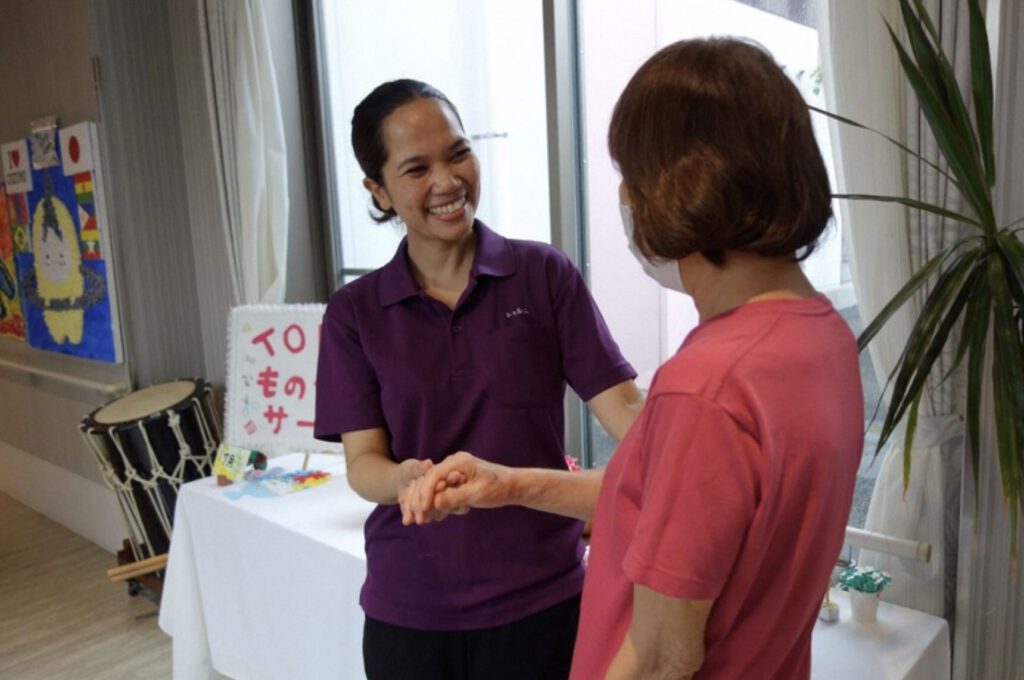
「こちらですよ」。フィリピン人のペリャブラス・シャルニジョイさん(35)が流ちょうな日本語で話しかけると、高齢女性は笑顔でうなずいた。手を取りながら、ペリャブラスさんは女性と一緒に施設の食堂へゆっくり進んでいく。
ここは群馬県大泉町の特別養護老人ホーム「あいの花」。35人の介護職員が働いているが、そのうち11人が外国人だ。
この施設が8年前にオープンしたとき、外国人は1人だけだった。
しかし、募集をかけても日本人の介護職員が集まらず、3年ほど前から外国人の採用の強化を始めた。
「介護の仕事は本当に人材難。外国人がいてくれて助かっている」。総括副施設長の木間大祐さんは話す。
人材不足に悩むのはこの施設だけではない。
それは全国の有効求人倍率をみれば一目瞭然だ。
厚生労働省によると、2009年度に1・33倍だった介護関係職種の有効求人倍率は24年度に4・08倍となった。全職種でみると24年度は1・14倍であり、介護関係が突出して「売り手市場」であることが分かる。
また、介護職員が不足しているとアンケートに答えた施設にその理由を聞いたところ、「採用が困難」と答えたのは86・6%に上った。
職員を集めることが大きな課題となるなか、外国人はその穴を埋める貴重な存在とな…
full text:
https://mainichi.jp/articles/20251027/k00/00m/040/032000c
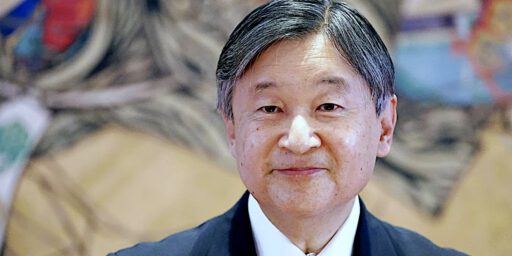

-512x256.jpg)
